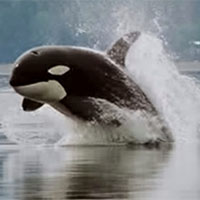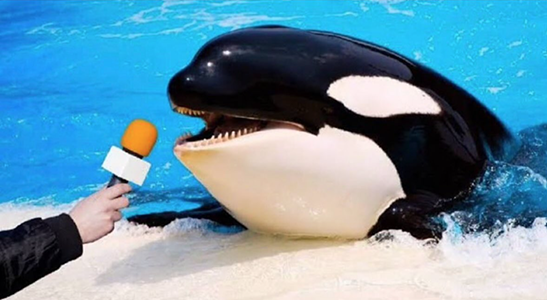— from Washington Post —

In the Salish Sea off Seattle and Vancouver lives an orca with a tall, hooked dorsal fin. Her formal name is J19, but she is better known as Shachi. And Shachi is a boss.
As the leader of J Pod, one of three related orca family groups that make up the area’s southern resident killer whale population, Shachi’s presence is critical to the success of the pod’s younger members. Matriarchs lead their pods to rich hunting grounds, help other whales hunt and have been spotted sharing fish with young novices.
But there’s something even more special about Shachi: At 40 years of age, she is not just a matriarch, but a grandmother. Shachi gave birth in 2005 to a female called Eclipse, who a decade later produced a male named Nova. Eclipse, at 10, was the youngest female ever known to reproduce, and she did so after a period of low numbers of Chinook salmon — a fish the orcas rely on.
“Most of the calves that were born in that period did not survive,” said Michael Weiss, a behavioral ecologist at the University of Exeter in the United Kingdom who has been studying this whale population since 2012. “But [Nova], the son of this small, inexperienced mother, is still growing, looking healthy, and is one of the most active, social members of the pod.”
How did Nova make it? Weiss gives credit to Grandma Shachi, who often stuck by Nova’s side as his mother was off foraging. Shachi “seems to have really taken on a major caregiving role,” he said.
The dividends paid by Shachi’s extra effort with her grand-offspring were not unique, according to a study published Monday on the “grandmother effect” in this orca population. If a southern resident grandmother orca dies, her grand-whales are much more likely to perish within two years, it found. That death sentence becomes even more probable if she dies when Chinook salmon are sparse, suggesting that active grandmothers act as a sort of buffer between their grandbabies and famine.
Using more than 40 years’ worth of observational data, the researchers pieced together family relationships, births, deaths and salmon abundance statistics to show that the grandmother effect is a powerful evolutionary strategy. So powerful, in fact, that the death of a grandmother can negatively affect a grand-whale’s chance of survival even after it has reached adulthood.
“The grandmother effect that we have shown also appears to impact whales for their entire lives,” said Daniel Franks, a biologist at the University of York and senior author of the study, which was published in Proceedings of the National Academy of Sciences.
READ FULL ARTICLE: https://www.washingtonpost.com/science/2019/12/09/one-key-orca-survival-grandmothers/








